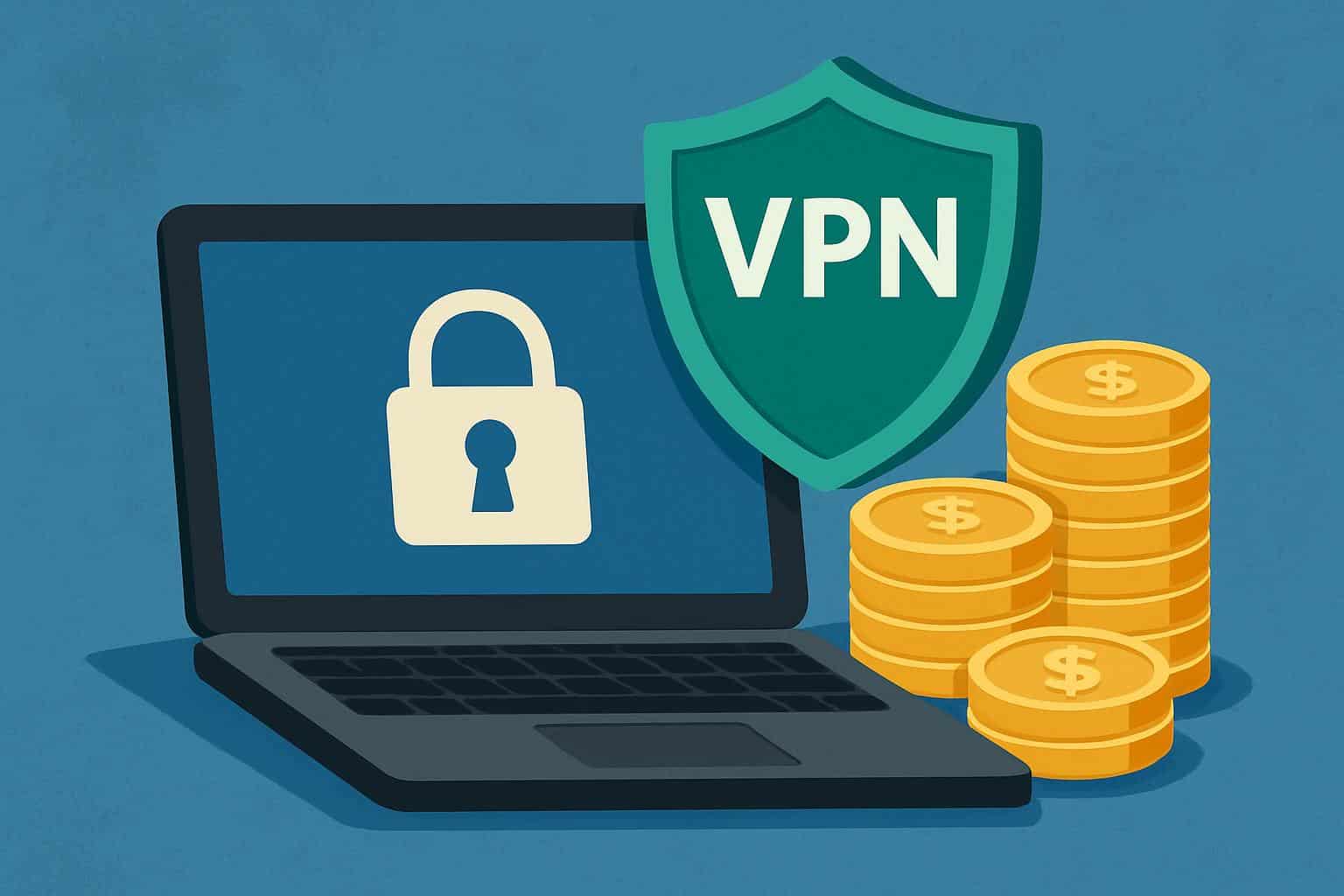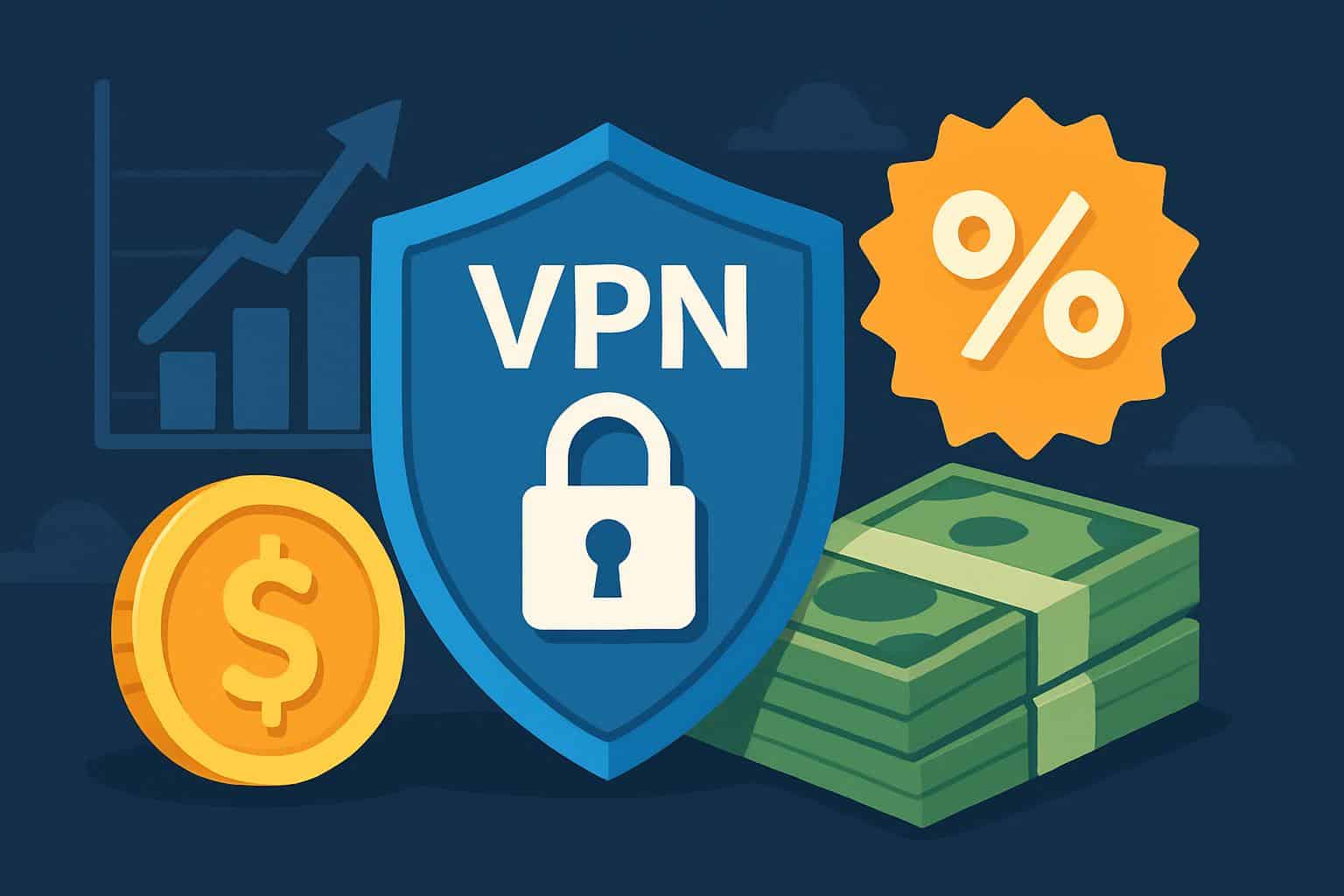The best VPN deals combine real savings with strong privacy protection, not just a deep discount. Most top services regularly run promotions in the range of 70%–96% off long-term plans, but there might be caveats, such as extra costs for renewal terms or whether it’s backed by independent audits (you can see our own ongoing discounts here), and our best VPN services roundup will clue you in on more providers’ current deals. Here, in a brief guide led by experts, are some offers to consider and the indicators that set a good deal apart from buyer’s remorse.
Industry trackers and provider rate cards as a baseline show those plans often land in the vicinity of $12–$14 a month. The steepest VPN discounts on average come in at one- to three-year terms, which might slash effective rates to around $2–$3 per month with bonus months thrown in. Sounds fine and dandy, but countless promos reset to standard rates at renewal — frequently 2x or more — so the smart play is to compare first-cycle savings against what you’ll pay over the full commitment.

How to Tell If a VPN Sale Is Real and Worth It
Read the renewal line. A “$2.19/mo” splash is typically for 24–36 months prepaid — get in on the act fast before you have to pay the regular price. Check what happens when the term is up, and whether you can revert to a lesser subscription before then. If the second year’s rate is full price, your “deal” may not be a deal after all.
Check the refund window. Many quality services offer 30-day money-back guarantees, with the odd provider extending to 45 days. That cooling-off period gives you time to test performance by streaming on all of your devices and networks before you’re stuck.
Evaluate bundles honestly. Password managers, cloud storage and data-breach monitoring are potentially useful products, but they’re a good deal only if you’d use them enough to justify paying for them. If you already subscribe to a specific manager or storage provider, the VPN-only plan is typically less expensive even when you factor in the bundle discount.
Best VPN Deals From Reputable Services to Trust
Surfshark, Private Internet Access and IPVanish tend to offer the grittiest long-term deals, sometimes dropping under $2.50 a month for multi-year contracts.
Surfshark and PIA both offer unlimited simultaneous connections, which can represent a huge value for families or device-heavy homes.
NordVPN and CyberGhost often bundle deep two-year discounts with additional months for free. NordVPN’s packages sometimes include a password manager or file locker for a slight upcharge, and its Meshnet device-linking feature can be an interesting tiebreaker for remote access or small team usage.
ExpressVPN doesn’t often touch the very lowest headline price, but promotions that include an extra couple of free months are certainly common. Its Lightway protocol and steadfast streaming access attract those who travel often and prioritize reliability over the lowest possible prices.
Proton VPN sometimes offers long-term discount plans, and it has a robust free tier with no data cap. Its paid packages sometimes make sense to buyers who prioritize audited privacy and robust jurisdictional protections even at a slightly higher effective monthly rate.
On the privacy side of things, you want providers that boast independent audits (from companies like Cure53, Deloitte or PwC), RAM-only server infrastructure and verifiable no-logging claims. There are court records and third-party verifications for services including Private Internet Access, ExpressVPN and others to build trust over time (and bring some much-needed context when comparing strikingly similar prices).

What Features Should We Consider Beyond the Price
Protocol and handshake: WireGuard and newer protocols (like IKEv2 and proprietary options such as Lightway) typically produce faster speeds and faster handshakes than legacy OpenVPN. If you do a lot of large file transfers or stream in 4K, this distinction is apparent.
Device limits and platforms: Unlimited connections are a great value. Failing that, look at caps (usually 6–10) and confirm apps on each platform you’ve got — Windows, macOS, Android, iOS, Linux and routers.
Power tools: Split tunneling, multi-hop, ad and tracker blocking, dedicated IP addresses and mesh networking can all be worth a little extra if they solve actual problems for you.
For instance, a dedicated IP can streamline remote work by limiting login friction, and multi-hop further obfuscates sensitive research.
Jurisdiction and audit: If a privacy provider is based in jurisdictions like Switzerland or the British Virgin Islands, that often indicates better governance than pure marketing hype, as do recent independent audits. Verified no-logs policies are recommended by consumer advocacy and digital rights groups.
When to Buy and How to Stack VPN Savings Smartly
It’s around big shopping events and privacy awareness campaigns that the best promotions tend to congeal. You can stack discounts by layering multiyear plans with student or family benefits where available and watching for extra months offered at checkout.
Newsletter sign-ups and in-app onboarding can sometimes unlock better first-cycle rates than public landing pages. If you’re skittish about a long-term commitment, begin with the monthly package, test performance at peak hours and then upgrade within the refund window to qualify for that larger discount.
What to Avoid in Cheap VPNs and Too-Good-To-Be-True Ads
“Lifetime” deals are risky; a change in ownership, company shutdown or new logging practices can leave you stranded. Be suspicious of sketchy privacy policies, nebulous ownership structures or apps that ask for too many inappropriate permissions.
Free VPNs tend to make a business out of collecting your data or feeding you advertisements. Academic labs and consumer watchdogs have found that the tracking libraries in some free VPN apps are used to collect your data. If cost is absolutely critical, some businesses might qualify for a well-supported free tier with tight limits from somebody who also sells a premium plan and is audited.
Quick Picks by Deal Value for Different Priorities
- Budget long term with lots of devices: Surfshark, Private Internet Access and IPVanish often offer sub-$3 monthly rates and no connection limit, great for families and power users.
- Mid-tier discount with premium bonus months: NordVPN and CyberGhost frequently serve up special two-year plans with extra months or add-ons thrown in for good measure.
- Privacy-first even when deals are smaller: Proton VPN, Mullvad and other audit-heavy providers might cost a few dollars more per month, but they stand out on governance, transparency and security design — qualities that trump any sales.
The bottom line: It’s not just the cheapest advertised monthly figure that determines a great VPN deal. What separates it is the first-cycle price, renewal terms, verified privacy and features that you’ll actually use. So if a promotion hits all four of the right notes, it’s worth betting on.

